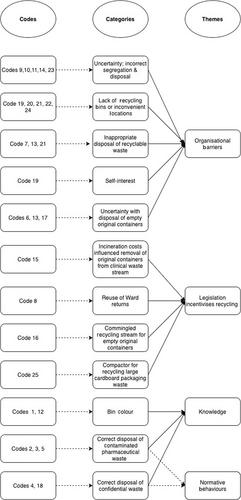Pharmaceutical waste disposal practices: a case study of an Australian public hospital pharmacy department
Abstract
Background
In Queensland, each hospital and health service (local hospital network) has its own waste reduction and recycling plan to comply with the Queensland Government's Waste Reduction and Recycling Act 2011 (Qld). The aim is to reduce both the hospital's carbon footprint and waste handling costs. Hospital environmental waste services staff do not audit pharmaceutical waste bins as this requires the presence of a registered pharmacist.
Aim
Since previous published studies of healthcare waste disposal practices have not included pharmacy waste bin audits, this study aimed to investigate waste disposal behaviours in a hospital pharmacy department.
Method
This sequential, two-phase mixed methods study was conducted in a metropolitan, tertiary public hospital's pharmacy department in Queensland. Phase I involved semi-structured interviews of hospital pharmacists and pharmacy technicians while Phase II comprised bin audits of the pharmacy department's waste streams.
Results
The bin audits revealed 36.1%, 23.8%, and 4.9% of recyclable waste in the clinical waste stream for each of the three bin audits respectively. In the general waste stream, the two bin audits of this stream revealed 14.3% and 44.4%, respectively. The reasons were identified in the interviews: there were no recycling bins in the main dispensing areas and there was confusion surrounding correct disposal of original containers and non-contaminated packaging waste. Non-paper waste was found in the confidential (shredded) waste stream in the two bin audits of this stream (10.1% and 16.7%, respectively).
Conclusion
Provision of commingled recycling bins and clean office paper waste bins in dispensing areas and education of staff on correct waste segregation processes will improve waste segregation in hospital pharmacy departments with both financial and environmental benefits for the hospital and the general population.


 求助内容:
求助内容: 应助结果提醒方式:
应助结果提醒方式:


